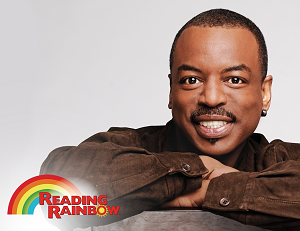Reading Rainbow Reaches for $5 Million Mark on Kickstarter
Levar Burton, known for hosting the popular PBS children's show "Reading Rainbow" has earned over $3.5 million dollars on Kickstarter to expand his "Reading Rainbow" app for a cost. His goal is to reach $5 million, and his fundraising success hasn't come without criticism.

Image courtesy of Reading Rainbow.
In May 2014, LeVar Burton, former-host of the Reading Rainbow—the PBS children’s television series that aired from 1983 until 2009—made headlines when Burton launched a Kickstarter campaign to raise $1 million in funds to expand the Reading Rainbow app for tablets that he'dd released back in 2012. Within 11 hours of his Kickstarter debut on May 28, he raised $1 million. In 2011, Burton, with his business partner, Mark Wolfe, acquired the acquired the license to Reading Rainbow and founded the company RRKidz. The duo’s plans are to expand to the reading app to the web, mobile devices, game consoles, and Internet-connected televisions; they also plan to use the money raised to provide the Reading Rainbow app "to thousands of disadvantaged classrooms for free." “So many people grew up with the show that we have a large and devoted following,” said Wolfe. As of June 11, approximately 80,000 backers have pledged $3,665,532, exceeding the original $1 million goal. The campaign's goal was then revised to $5 million. The campaign will remain on Kickstarter until July 2. Currently available on the Apple or the Amazon app store, the Reading Rainbow app contains more than 10 million books and video field trips for children ages three to nine. While the Reading Rainbow app does offer up to five books for free, it is currently a paid subscription service. Users pay $9.99 per month (or $29.99 for 6 months) for unlimited access for as many as five users. (The intention would be to charge a subscription for future Reading Rainbow services to the majority of its users.) The success of this campaign has not been without backlash. In a May 28 Washington Post article, readers were asked to reconsider donating to the project. The article criticizes Burton for monetizing Reading Rainbow and suggests a better way to get books to needy kids is by giving to nonprofits such as Children’s Literacy Initiative or First Book. In the response to the criticism, Wolfe says, “Authors have to get paid for their books. None of us are ashamed or embarrassed by the fact that we have to generate revenue as a company that has to be funded initially by investors in order to do this. The point of the revenue is to create more products and create more ways to reach people.” Chiming in defense of Burton’s Kickstarter campaign, librarian and blogger Karen Jensen of “Teen Librarian Toolbox” wrote:“The beauty of it all is that a Kickstarter is completely voluntary. If it's not your cause, that's cool. Don't donate. Support the things that you are personally passionate about and let others do the same. This is actually a really good system, because it means that we end up with a lot of different things in this world, instead of all of one kind of thing.”There have been a number of literacy studies in the past, such as “Inside ‘Reading Rainbow’: A Spectrum of Strategies for Promoting Literacy (Wood and Duke, 1997), that have explored the Reading Rainbow approach and its effectiveness. But according to Wolfe, the best results are seeing the actual response from the public. “We are number one on the education app list, with more than 15 million books read, including history books. We get hundreds and hundreds of emails that tell me, ‘You taught my child to read,’ or ‘My reluctant reader went up two levels in school,’” says Wolfe. “Those are the types of feedback that tell us that we’re having actual on-the-ground impact.” The Reading Rainbow team will launch their pilot classroom app for the 2014-2015 school year.
Yin Mei is a freelancer and Minnesotan who has lived in the Bay Area, New York, France, and China. She enjoys covering topics from China’s social media trends to education in the United States. Follow her @MeiThoughts.
Add Comment :-
RELATED
RECOMMENDED
CAREERS
The job outlook in 2030: Librarians will be in demand
CAREERS
The job outlook in 2030: Librarians will be in demand
ALREADY A SUBSCRIBER? LOG IN
We are currently offering this content for free. Sign up now to activate your personal profile, where you can save articles for future viewing





